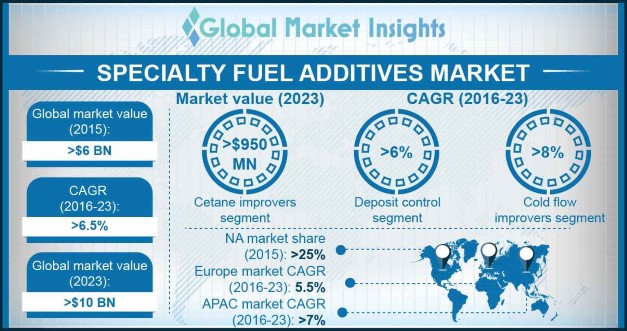Home > Chemicals & Materials > Specialty Fuel Additives Market
Specialty Fuel Additives Market Size
- Report ID: GMI369
- Published Date: Mar 2016
- Report Format: PDF
Specialty Fuel Additives Market Size
Specialty Fuel Additives Market size was recorded at over $6 billion in 2015, with an estimated growth rate of more than 6.5% from 2016 to 2023.
Rise in high toxic emissions due to expansion in the manufacturing sector along with increased usage of vehicles has induced the law makers to make stringent regulations across the world, which is driving specialty fuel additives market. Upsurge in biofuel consumption across various industries will augment the global market. One of the widely used biofuels is ethanol, which acts as an additive to gasoline.
Increasing ethanol consumption is likely to provide a boost to the demand for specialty fuel additives. As per estimates, the global annual consumption of ethanol increased from 21.8 billion gallons in 2012 to 25.6 billion gallons in 2015, which is likely to drive the industry growth.
| Report Attribute | Details |
|---|---|
| Base Year: | 2015 |
| Specialty Fuel Additives Market Size in 2015: | 6 Billion (USD) |
| Forecast Period: | 2016 to 2023 |
| Forecast Period 2016 to 2023 CAGR: | 6.5% |
| 2023 Value Projection: | 10 Billion (USD) |
| Historical Data for: | 2012 to 2015 |
| No. of Pages: | 130 |
| Tables, Charts & Figures: | 88 |
| Segments covered: | Product, Application and Region |
| Growth Drivers: |
|
| Pitfalls & Challenges: |
|
The Environmental Protection Act of the U.S. has made it mandatory for heavy vehicles to use cleaner diesel with low sulfur content. Low sulfur content requires cold flow improvers which is a type of specialty fuel additive. This act is expected to positively influence the specialty fuel additives market. In the U.S., consumption of ultra-low sulfur diesel (ULSD) containing 0-15 ppm (parts per million) in 2012 was stated to be 1,255.5 million gallons.
Additionally, use of corrosion inhibitors (which is a type of specialty fuel additive) for protecting the fuel distribution and storage systems in automobiles will also drive the global specialty fuel additives market. Growing usage of alternative fuels like compressed natural gas (CNG) and liquid petroleum gas (LPG), may act as challenge for specialty fuel additive products.

